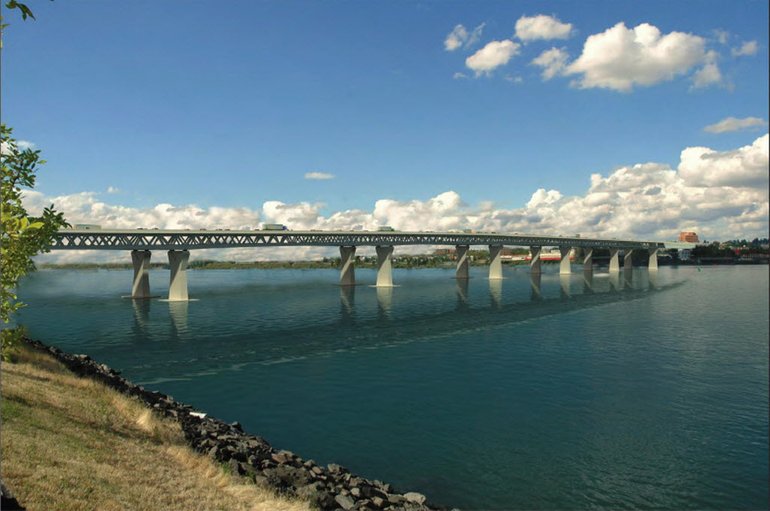An Oregon appeals board this week ruled that the state’s Metro Council overstepped its bounds — slightly — in giving its go-ahead to the Columbia River Crossing through a Land Use Final Order. But the Oregon Land Use Board of Appeals ruling otherwise shot down a legal challenge to the CRC filed in August.
The Metro Council earlier this year approved a Land Use Final Order, effectively signing off on CRC light rail and freeway improvements on the Oregon side of the river. The more than $3 billion project would replace the Interstate 5 Bridge and extend light rail from Portland to Vancouver.
One problem: Oregon’s Land Use Final Order law — crafted in the 1990s for a separate light rail project proposed then — only applies within the Portland area urban growth boundary. That only extends as far as the north shore of Hayden Island — not to the Washington-Oregon state line, as Metro’s land use order did.
That gap was raised as part of the legal challenge mounted by a group of Oregon business and neighborhood advocates. The appeals board agreed, writing in part, “Metro’s approval of a project that is not located entirely within the (urban growth boundary) exceeds the authority Metro was granted by the 1996 statute.”
That discrepancy isn’t likely to derail the CRC or its planning process, said Metro senior attorney Richard Benner. In response, he said, Metro will likely do one of two things: Either extend the urban growth boundary north to the state line, or bring the scope of the land use order back to the existing boundary to put them in line with each other. The agency hasn’t decided which path to pursue, Benner said.
Metro was one of six local agencies to approve project plans earlier this year, along with C-Tran, the Southwest Washington Regional Transportation Council, TriMet, and both the Oregon and Washington departments of transportation. Those plans are now waiting for federal approval.
The legal challenge — brought jointly by Weber Coastal Bells, the Northeast Coalition of Neighborhoods, the Coalition for a Livable Future, Plaid Pantries Inc. and Jantzen/Angel LLC — also contended the Land Use Final Order law is too narrow to apply to a project as broad as the CRC. But the appeals board denied that and all other arguments, essentially approving all parts of Metro’s order within the urban growth boundary.
CRC spokeswoman Anne Pressentin said the appeals board’s ruling “validated” Metro’s action, siding in favor of the agency on all but one point. On the jurisdictional matter, planners will resolve it as soon as possible, she said.
“We still need to work through one issue, and we think we’ll be able to do that fairly easily,” she said.
The board’s ruling can be appealed to the Oregon Supreme Court.
Eric Florip: 360-735-4541; ww.twitter.com/col_enviro; eric.florip@columbian.com.




